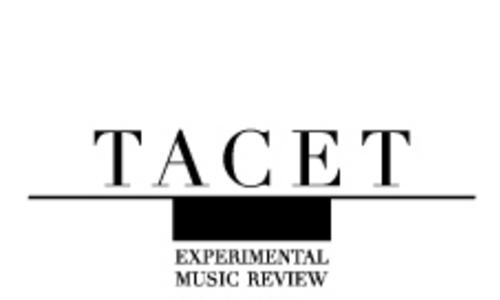CFP: L’expérimentation en question / Experimentation in question (Université Paris)

TACET, EXPERIMENTAL MUSIC REVIEW #2 | WWW.TACET.EU
APPEL À CONTRIBUTIONS | CALL FOR PAPERS
L’expérimentation en question | Experimentation in question
Dossier dirigé par | Issue edited by
Matthieu Saladin – IDEAT (Université Paris 1/CNRS), Le Quai – École Supérieure d’Art de Mulhouse
According to one of the definitions of experimental music formulated by John Cage, the role of experimentation is to ask questions rather than to provide canned answers. This issue of TACET seeks to turn this saying back on experimentation itself, by examining its principles, manifestations and challenges, both historical (provided they question our contemporaneity) and current.
From a historical point of view, the expression “experimental music” has typically been used to describe the practices of musicians and composers, mainly Anglo-Saxons, reunited around the music and ideas of John Cage, or at least directly or indirectly claiming as such. Indeterminacy, process and the interest in “new” sounds are its major lines of research. However, this expression equally refers to previous musical and/or artistic trends (futurism with Russolo and the emergence of sound poetry, the first electronic music works in Russia, etc.) which have contributed to the bringing back of rules that governed sound creation to the drawing board. At the same time as Cage carried out his first experiments with chance, Pierre Schaeffer was also able to use the name “experimental music” in a very different sense. From the 1970s, the field covered by this expression widened under the momentum of improvised music, experiments carried out in the nebulous world of rock, minimalism and electronic music. Today, its application appears to have become so varied that its meaning is no longer clear, as ultimately, due to the lack of appropriate terms, it encompasses any musical practice with “suspect” noises.
The fact remains that this expression “defines” a field of particularly heterogeneous sound practices, or even one with antagonistic issues and modalities, at times. Whilst experimentation has been able to attempt to call into question a progressive thinking of modernity, equally, it has been able to contribute to it in its demands for novelty. Likewise, while a certain experimental tradition calls for the withdrawal of the individual into their project, other forms seek to experiment with limits, both amongst musicians and listeners, or to question relationships with the collective. But the ambitions of experimentation are also to seek to disrupt the boundaries between art and life – or between the arts (polyartistic dimension) -, to invest in the possibilities offered by new technologies as well as questioning their domination and exploiting their shortcomings. To this elusive diversity, however, responds the contextual and local aspect of experimentation as such, which is in a position to question the claim of general or continuous experimentation, or even the ontology of musical trends defined in and of themselves as experimental. Where is experimentation to be found, therefore, within the diversity of experimental music? When is there experimentation? What are the processes used? What may be the differences and the tensions between the multiple uses of the term, which also vary according to the cultures and the socio-historical contexts? What are the forms of sound experimentation today? What movements can be observed, from one generation to the next, in the musical problems, but also the social and political problems that experimentation poses?
This issue of TACET seeks to address these questions from an interdisciplinary perspective (aesthetics, philosophy, musicology, cultural history, cultural studies, gender studies, sociology, political science, literature, psychoanalysis etc.) and it aims to bring together an ensemble of studies in which experimentation will be examined in the diversity of its forms and the heterogeneity of its problems. We await general analyses, special cases and cross-disciplinary studies.
The questions proposed in this call for papers are not exhaustive. They represent a few suggested general avenues of research for potential contributors. They do, nevertheless, seek to serve as a reminder that the TACET review expects in-depth studies with a well-argued subject. The Editorial Board will, in addition, pay particular attention to the editorial quality of contributions, considering that literary and poetic dimensions all have their place in the articulation and transmission of a thought. Authors are equally reminded that the journal is aimed at a broadened readership.
Authors should first inform the Editorial Board of TACET of their proposal for an article by email, stating the title of their contribution and attaching an abstract of their proposal. The articles themselves should be sent by email before the 15th of April 2012 to the following addresses: redaction@tacet.eu and matthieu.saladin@gmail.com
Attached to the article should be an abstract, a few key-words and a brief biography of the author. We ask authors to follow the instructions (article format, bibliographic standards) available at the following.
The editorial board
redaction@tacet.eu
------
You can download the call of papers in English at: www.tacet.eu/2
Please forward it, keeping in mind that this is a bilingual publication (FR/EN)


